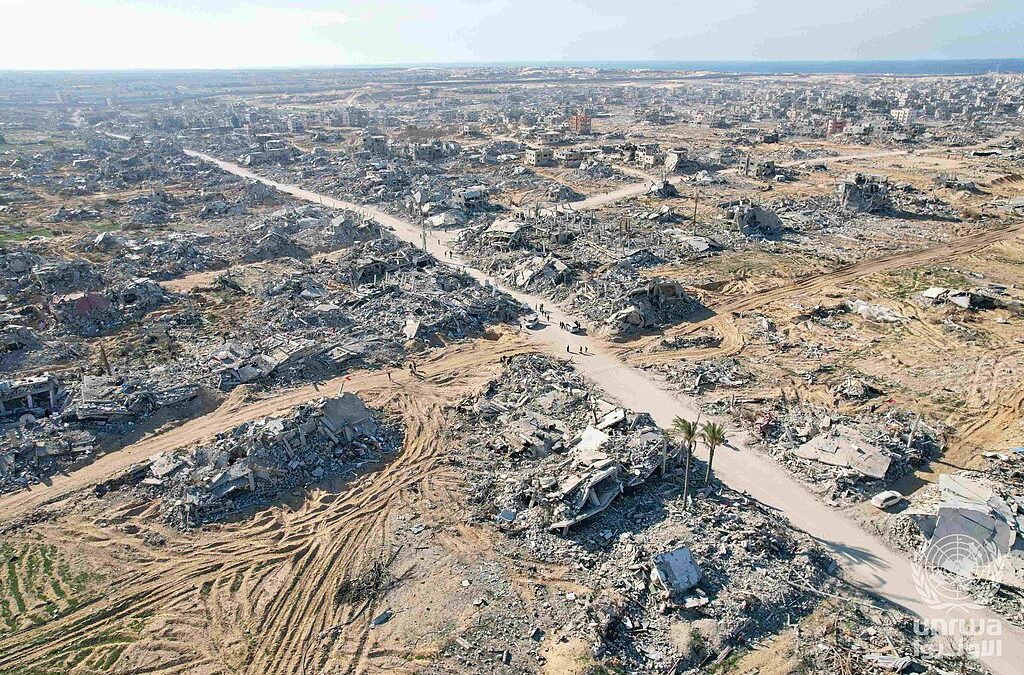Reflecting on the decision-making environment surrounding criminal sentencing in the context of unspeakable crimes against humanity and war crimes in Gaza, which can plausibly be considered a genocide, is both defeatist and hopeful. It is defeatist because contemplating the sentencing process for those responsible for the slaughter in Gaza implies an acceptance that we, as a global community, have once again failed to prevent ‘the crime of crimes’. However, it is also hopeful because considering sentencing for genocide and war crimes suggests that we can hold those responsible to account and deliver a measured punishment based on individual guilt, thereby instilling some fear in those who feel untouchable.
The rational and routine sentencing process
Modern criminal procedure is intentionally designed as a rational, objective, and predictable institutional response to criminal acts that cause harm and disruption to victims and the community. While each crime and criminal process is unique, they are also managed through seemingly routine institutional procedures. Particularly sentencing, as the final stage of the criminal process, focuses on determining a sentence based on rational and formulaic weighing and measuring of the gravity of the crime, the culpability of the defendant, and other aggravating and mitigating factors. But how do you weigh and measure the act of genocide, supported by horrific acts of mass starvation, scholasticide, domesticide, bombing of hospitals…?
The public generally perceives sentencing decisions as a routine function of the state apparatus and rarely disagrees with them
An important consequence is that this method transforms the final act of the criminal process into anything but a spectacle (despite its public and sometimes heavily publicised nature). It distances victims and communities from their potential desire for revenge, while still allowing for catharsis. It also reduces the perpetrator to a mere individual whose actions and behaviours are dispassionately compartmentalised into boxes prescribed by the law. Such an unemotional conclusion to a criminal process is especially notable in cases involving violent and mass crimes, such as crimes against humanity, war crimes, and genocide, which evoke stronger demands for revenge and are inherently sensational.
Sentencing a genocide

In recent times, genocide has been most impactfully adjudicated at the International Criminal Tribunal for Rwanda (ICTR) and its counterpart, the International Criminal Tribunal for the former Yugoslavia (ICTY). As these were ad hoc tribunals established internationally, the decision-making environment surrounding the sentencing processes was anything but stable, predictable, or routine.
The tribunals were formed within the context of the United Nations as a direct response to the outrage of the international community over the atrocities in the former Yugoslavia and Rwanda. Judges, prosecutors, and defence attorneys, operating in both English and French, who came from diverse countries and legal cultures, worked on a specific trial for years as part of large teams. The trials themselves occurred decades after the criminal acts they addressed. Beyond the institutional setting, the stakes and pressure were significantly higher than most of the actors involved had ever experienced in their lives, particularly regarding the interests and expectations of the affected communities (and states), the global public, and the media.
Nonetheless, when reading the sentencing paragraphs of judgments with guilty verdicts for genocide and viewing their proclamation, one is struck by how ordinary they are in their structure, diction, and presentation. In every judgment, the judges take special care to make sentencing decisions appear rational, formulaic, unsurprising, measured, in other words, normal. This helps create an image of a typical outcome in a standard criminal trial, despite the extraordinary nature of the matter and the circumstances in which the sentencing was passed. There was no separate sentencing hearing at the two tribunals, and the judges had considerable discretion in determining sentences for genocide, war crimes, and crimes against humanity. After thousands of pages of detailed descriptions of the atrocities (which began long before the end of the trial), the judges first outline the relevant law for sentencing and then provide a concise explanation of how they applied it to the case at hand. Being limited to prescribing a prison sentence of up to life or/and restitution, the judges had to consider the gravity of the offence and the individual circumstances of the convicted person, including mitigating and aggravating factors.
Judgement in the Mladic case
The sentencing paragraphs in the judgment of Mladić, the general found guilty of genocide in Srebrenica (alongside war crimes and crimes against humanity), serve as a powerful example. In the Mladić judgement, the judges explain that both retribution and deterrence are central to their sentencing decisions, whilst rehabilitation is of lesser importance. In their words:
Retribution is not to be interpreted as a desire for revenge or vengeance but as an expression of the outrage of the international community at the crimes committed; retribution, unlike vengeance, requires the imposition of a ‘just and appropriate punishment, and nothing more’.[…]The Trial Chamber further considers that an appropriate sentence for Mladić in this case essentially contributes to achieving a general deterrent effect. (para 5182, 5183).
Then the judges explain the gravity of the accused’s conduct in each crime for which he was found guilty. Over several paragraphs, they conclude that his involvement in crimes to be grave or of high level of gravity due to his position of authority.
Mladić has been found responsible for having committed a wide range of criminal acts through his participation in four JCEs (joint criminal enterprises). The crimes committed include some of the most heinous in international humanitarian law, namely genocide and extermination as a crime against humanity. In determining an appropriate sentence for Mladić, the Trial Chamber has considered the nature, scale, and brutality of the crimes for which Mladić has been found responsible, as well as the duration of his participation in those crimes and their overall impact on the victims and their families. (para 5188)
The judges then consider the individual circumstances of the accused, particularly the mitigating factors proposed by the defence concerning the benevolent treatment of, and assistance to, victims, his good character, diminished mental capacity, physical health, and age. They decide to consider only the last circumstance. The judges also reflect on the general practice regarding prison sentences in the courts of the former Yugoslavia and compare it with other cases that had come before the tribunal in the past. The sentencing part of the judgment concludes with a dry and unceremonious final statement:
The Trial Chamber has considered all the circumstances referred to above and finds that the appropriate sentence is life imprisonment. (para 5213)
Gaza and the International Criminal Court

Both ad-hoc tribunals are now a thing of the past, but their judgments remain an encouraging reminder that it is possible to sentence perpetrators once considered untouchable. They also demonstrate the remarkable ability of law and legal institutions to turn something extraordinary and unspeakable into a clear and standardised story that can be evaluated through a sentencing process. Inspired partly by experiences from these tribunals, the international community has established a permanent body to investigate genocide and other atrocities—the International Criminal Court (ICC).
While the decision-making environment for sentencing within the ICC is intended to be far more predictable and routine, the extraordinary subject matter makes it anything but. Recently, when the ICC indicted the leaders of Israel and Hamas for war crimes and crimes against humanity, the prosecutor and judges, who could ultimately decide on their sentencing, faced sanctions and intense political pressure from the US.
Nevertheless, will the ICC be the institution where this ongoing genocide in Gaza is judged, and sentences announced?






